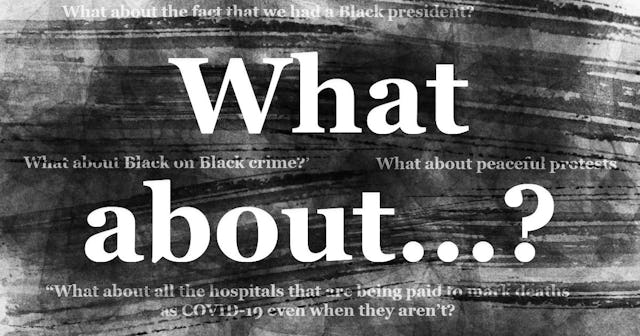If Your Argument Begins With 'But What About ...' You Probably Should Just Zip Your Lips

If you have spent any time online in the past several months, you have witnessed a huge uptick in “whataboutism” in response to the COVID 19 pandemic and the riots and protests in the shadow of George Floyd’s murder. In both cases people are trying to argue their way out of taking action, or reflecting on the serious ramifications of a pandemic and systematic racism in America. And it needs to stop.
The best description I have ever seen for whataboutism comes from writer Annie Reneau in an article for Scary Mommy: “… when someone points out the fact that Black Americans still have not attained true equality in our country, people come back with, ‘Equality? What about the fact that we had a Black president?!’ Of course, they forget the fact that people lynched Obama in effigy and continually used racial slurs to refer to his wife and children. They ignore the certain truth that had he had even a 10th of the personal history of his white successor, he’d never have gotten past the primaries. And they ignore the racial hurdles our one and only Black president had to cross — hurdles that are still there.”
Essentially, whataboutism is when you try to argue against something online with “what about…” and then make a sideline argument about something else entirely. Like the common retort from narrow-minded white folks, ‘what about Black on Black crime?’
Chatting with a good friend the other day, I mentioned how the U.S. recently passed the grim milestone of 100k deaths from COVID-19. He decided to “school” me by saying, “What about all the hospitals that are being paid to mark deaths as COVID-19 even when they aren’t? Frankly, I don’t believe those numbers.”
He failed to take a moment and think about how big of a number 100K is. Even if you were to cut that number in half, just for the sake of argument, that would still leave us with roughly 50K Americans dead from COVID-19. 58,220 American troops died in the Vietnam war. Even at half the actual total, the death toll would be just shy of matching a major American conflict that lasted years — and COVID-19 has been with us for a matter of months. That many American deaths really should give you pause, whether you believe the numbers are “inflated” or not. But people are so quick to jump into their whataboutism that they fail to see the issues actually at hand.
Robert Recker/Getty
Now, back to the example above from Annie Reneau. She wrote that example in 2017, but it’s just as relevant right now. In regard to the riots happening nationwide, we’ve all seen comments on our social media news feeds to the tune of, “What about peaceful protests? Why did it have to turn violent?”
Excuse me? Please don’t act like you didn’t see famous athletes take a knee. Don’t say that you didn’t see the cast of Hamilton make a statement. Don’t say that you didn’t read the stories, one after another, of unarmed people of color dying at the hands of the police. Don’t say that you didn’t shrug it off, or call for action against people like Colin Kaepernick, because there were countless opportunities to address these issues before now. Countless. And nothing changed, nothing happened, so here we are.
The sad fact is, people riot when they feel unheard, and we weren’t listening. So it’s time to take your whataboutism, shove it, and get involved in change, because you are on the wrong side of history.
Whataboutism is at an all-time high right now (and it’s likely no coincidence, seeing as our current administration engages in it with an astonishing frequency). It is a way for people to avoid the real issue. It is a way for those who do not want to accept reality and do the work of making lasting change to try to divert the facts and avoid taking action. Whataboutism muddies the water by trying to change the subject, and ultimately changes the narrative away from its true focus.
This is what I’m asking you to do, and it really isn’t that hard. Next time you think to yourself “but what about…” stop and actually think it through before you start speaking (or typing). Follow it all the way down to a logical conclusion before you let it out of your brain. Chances are, if your statement begins with “what about,” you can safely assume you’re diverting from the issue at hand.
Check yourself. That simple action will help make the world a safer place for everybody, I assure you. Or if nothing else, it will at least stop making you look like a jerk.
This article was originally published on